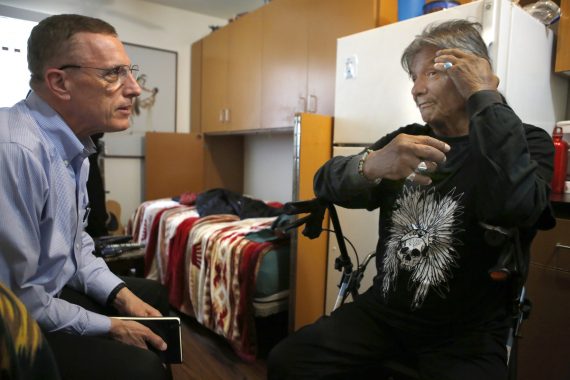BY ALEXANDRIA BORDAS in the Miami Herald.
Two Well Known Advocates Change Careers, Well Sorta.
by

I want to thank everyone, once again, for your kind words of support about my appointment last week to a congressional advisory committee. Our first meeting will be next week and I will keep you informed of our progress. Meanwhile:
(8-21-17) Mira Signer and Virgil Stucker, two highly-respected mental health advocates, have moved to new careers.
After working for a decade at the National Alliance on Mental Illness of Virginia, Mira has resigned as executive director to become the System of Care Director for Magellan Health of Virginia.
Magellan Health of Virginia has the state’s contract to provide behavioral health services for those on Medicaid and also on children’s assisted health insurance.
During her tenure, Mira was a much needed strong, relentless and fearless voice. Most recently, she was responsible for boldly protesting about the death of Jamycheal Mitchell, who literally starved in the Hampton Roads Regional Jail. It was Mira who helped organize a letter from advocacy groups that asked the U.S. Justice Department to investigate Mitchell’s death after the disAbility Law Center, the state Inspector General, and the Virginia Attorney General shamefully ducked their duties.
In an email about the career change, Mira wrote:
“I wasn’t expecting it but the opportunity arose and while it was an extremely tough decision given my love for the work, I felt it was a great opportunity to learn and be challenged in new ways, to bring my voice and experiences into the managed care world and work within systems to educate and guide policy decisions to make a positive difference.”
She will be sorely missed.
I’m Honored To Be Named To Federal Committee Advising Congress About Mental Health And Substance Issues: 14 Public Members
by

I am delighted to be joining Elyn Saks and other advocates on federal committee
(8-17-17) I am deeply honored and excited about being named yesterday by the Department of Health and Human Services to a special committee created by Congress to help oversee reform of our federal mental health care system.
I wish to thank U.S. Senator John Cornyn, (R-Tx.), Virginia state Senator Creigh Deeds (D.), and Miami Dade Judge Steven Leifman for recommending me to HHS Secretary Tom Price.
Rep. Tim Murphy’s Helping Families in Mental Health Crisis Act first cited the need for an oversight panel that would report to Congress and include 14 public members, including at least one parent. I am thrilled to have been chosen for that slot, although several other members of the group also either have or are related to individuals with mental illnesses and addictions. (The required composition is listed at the end of this post.)
A compromised version of the Pennsylvania Republican’s Mental Health Crisis bill was signed into law during the final days of the Obama administration creating both a new Assistant Secretary for Mental Health and Substance Abuse and an Interdepartmental Serious Mental Illness Coordinating Committee (ISMICC).
The committee is composed of senior leaders from ten federal agencies including HHS, the Departments of Justice, Labor, Veterans Affairs, Defense, Housing and Urban Development, Education, Labor and the Social Security administration along with the 14 non-federal members who were selected from more than 200 applicants. The other 13 members chosen for the committee include many familiar names:
- Linda S. Beeber, Ph.D., PMHCNS-BC, FAAN, Distinguished Professor, University of North Carolina-Chapel Hill, School of Nursing;
- Ron Bruno, Founding Board Member and Second Vice President, CIT International;
- Clayton Chau, M.D., Ph.D., Regional Executive Medical Director, Institute for Mental Health and Wellness at St. Joseph-Hoag Health;
- David Covington, LPC, MBA, CEO/President, RI International;
- Maryann Davis, Ph.D., Research Associate Professor, Department of Psychiatry, University of Massachusetts Medical Center;
- Paul Emrich, Ph.D., Under Secretary of Family and Mental Health Chickasaw Nation;
- Mary Giliberti, J.D., Chief Executive Officer, National Alliance for Mental Illness, National Alliance on Mental Illness;
- Elena Kravitz, Peer Support Provider and Manager, Collaborative Support Programs of New Jersey;
- Kenneth Minkoff, M.D., Zia Partners;
- Elyn Saks, J.D., Ph.D., Professor of Law, Legal Scholar, University of Southern California Gould School of Law;
- John Snook, Esq., Executive Director/Attorney, Treatment Advocacy Center;
- Rhathelia Stroud, J.D., Presiding Judge, DeKalb County Magistrate Court; and
- Conni Wells, Owner/Manager, Axis Group, LLC.
Judge Steve Leifman Gets Results, Turns Miami-Dade Into A Showplace For Recovery Services! Bravo!
by
(8-16-17) While many are enjoying vacations during the final days of summer, my good friend and one of the heroes in my book, Judge Steve Leifman, continues to push for ending costly and inappropriate incarceration of individuals with severe mental illnesses and abuse problems. This month, Judge Leifman joined Norman Ornstein in publishing an article in The Atlantic about CIT and jail diversion. At about the same time, the Miami Herald published a story about Judge Leifman’s continued efforts to turn Miami into a national model. Bravo Judge! Bravo!
How Mental-Health Training for Police Can Save Lives—and Taxpayer Dollars
But only if officials at all levels of government are willing to invest in it up front.

Since 2010, the City of Miami and Miami-Dade County police, have handled 71,628 mental health-related calls—but only have made only 138 arrests. Miami-Dade taxpayers were on the hook for millions of dollars from wrongful-death lawsuits; today, fatal shootings are down almost 90 percent. More than 20 percent of those in county jails had serious mental illnesses, costing many millions to keep them there. Recently, the decline in arrests and incarcerations enabled the county to close a jail and save taxpayers $12 million a year.
What changed?
A comprehensive program to structurally transform the way the community responded to people with mental illnesses.
Read the entire article here.
A mental-health facility 13 years in the making is one vote away from becoming reality
Judge Steven Leifman checks the architecture floorplans as he looks beyond the Sept. 7 county commissioners vote and into the future renovations.
The seven-story building near west Wynwood looks like what it is: an abandoned psychiatric treatment center. The rooms are bare, with worn-out mattress bolted to the colorless concrete floor adjacent to metal toilets. An X-ray scanner sits in an otherwise empty treatment room, surrounded by dirty-white cinder-block walls. The entrance to a cavernous gym is blocked by uprooted wooden floor planks, where two deflated, dust-covered basketballs sit mid-court.
For Steven Leifman, this is a dream come true.
Rep. Murphy’s Visit To Housing Project Is A Testament To His Commitment To Fix Our System – And CSH Shows Him Best Practices
by

Rep. Timothy F. Murphy (R-Pa.), left, speaks with Richard LaRush in LaRush’s Step Up on Second apartment. (Christian K. Lee / Los Angeles Times)
(8-14-17) I am thrilled the Los Angeles Times used Rep. Tim Murphy’s recent visit to Santa Monica’s Step Up on Second housing project in California as a vehicle to answer questions about mental illness and homelessness.
After having worked tirelessly for nearly five years to shepherd his mental health reform bill through Congress and get it signed into law last year, you might believe the Pennsylvania Republican would move on to other issues. Yet, he continues to focus on serious mental illnesses and addiction. As the only practicing psychologist in Congress, he is in a unique position to understand the importance of supportive housing in helping people recover. His visit was a reassuring testament of how committed he is to fixing our failing mental health care system.
I was especially happy that he toured the Step Up on Second project because the Corporation for Supportive Housing, a national nonprofit that helps communities finance and build affordable housing, is one of its backers. I serve on the CSH board. In fact, it is the only board that I serve on. That’s because CSH has demonstrated that people with mental illnesses and substance abuse, who are facing homelessness, can thrive with the right combination of stable, permanent housing and meaningful case management and treatment services.
Such a holistic approach sustains the dignity of the individual and benefits the entire community, delivering lower costs and improved quality of life.
The Los Angeles Times used Rep. Murphy’s visit to publish a Question and Answer feature that separates facts from fiction when it comes to homelessness.
Mental illness and homelessness are connected. But not how you might think
Even as Los Angeles starts a $1.2-billion homeless housing construction program, residents from Temple City to Venice are fighting to keep homeless projects out of their neighborhoods.
But since 1995, chronically homeless mentally ill people — a widely shunned subgroup — have been living in Santa Monica’s Step Up on Second apartments, a block from the tourist-friendly Third Street Promenade and close enough to the beach to feel the salt air.
“Look around. It’s here,” Rep. Timothy F. Murphy (R-Pa.) said during a recent visit, describing why he sees Step Up’s residential programs as a national model.
After Only Two Years, Fairfax Is Recognized As National Jail Diversion Model; But Still More To Do.
by

Sheriff Kincaid monitoring inmates in detention center
(8-11-17) I am amazed. In less than two years, Fairfax County, Virginia, has gone from showing little interest in jail diversion to being spotlighted as a national model.
Bravo! That’s a true accomplishment. Still, there is more to do but let’s focus first on the positive.
Nine Fairfax officials have been asked to speak in September at a Data Driven Justice and Behavioral Health Design Institute meeting in Rockville, Maryland, about how the county has successfully implemented its Diversion First program. The meeting is being sponsored by the Substance Abuse and Mental Health Services Administration (SAMHSA), the Laura and John Arnold Foundation (LJAF) and the National Association of Counties (NACo). It’s designed to help community leaders from across the nation learn how to create jail diversion programs by inviting those who already have established successful programs to share their knowledge.
Sheriff Stacey Kincaid deserves much of the credit for bringing jail diversion to Fairfax. After the 2015 tragic death of Natasha McKenna in the Fairfax Adult Detention Center, the sheriff traveled to Bexar County, Texas, to learn about its diversion program and returned determined to establish something similar. (Compare her commendable actions to the shameful response by officials at the Hampton Roads Regional jail, where Jamycheal Mitchell literally starved to death. They insisted they hadn’t done anything wrong and kept information from the public.)
In the county’s official press release, posted at the end of this blog, Sheriff Kincaid shares credit.
“A primary reason we have come so far so fast is that we have 180 stakeholders, including law enforcement; mental health providers, advocates and consumers; county government leaders; defense attorneys and prosecutors; and magistrates and judges. We cannot and do not solve problems by operating in silos.”
That’s certainly true, but the main diversion champions in Fairfax have been the sheriff, Board of Supervisor Chair Sharon Bulova, Supervisor John Cook, Police Chief Edwin C. Roessler Jr., Program Director Laura Yager, and several Community Services Board leaders, such as retired Air Force General Gary Ambrose, Tisha Deeghan, and Daryl Washington.
While I’m ecstatic about what has been accomplished, Fairfax needs to take further steps.


